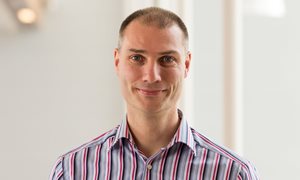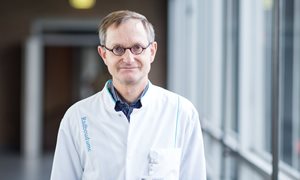17 January 2018

The WHO defines palliative care as: an approach that improves the quality of life of patients and their families facing the problem associated with life-threatening illness, through the prevention and relief of suffering by means of early identification and impeccable assessment and treatment of pain and other problems, physical, psychosocial and spiritual. It has been shown in several RCTs that early palliative care improves quality of life, decreases futile, aggressive interventions, and decreases health care costs. However, in daily practice palliative care is still restricted to reactive, terminal care (crisis management) to patients with cancer.
Therefore, all four projects have one common goal: contributing to the provision of high quality, early palliative care.

1. Doorontwikkeling van het goede voorbeeld 'Proactieve palliatieve Zorgplanning' naar 'Proactieve Palliatieve zorgplanning 2020’.
Yvonne Engels, associate professor in timely palliative care (Dept of Anesthesiology, Pain and Palliative Medicine) will update a previously developed programme for early, proactive palliative care. This programme, initially started by general practitioner Bregje Thoonsen, as part of her PhD trajectory, is one of the ‘Good Examples’ for palliative care of ZonMw. In this project we will validate a promising, innovative, easy to apply means to screen for palliative care needs: the double Surprise Question. Besides, we will develop a training module for professionals regarding signalling and exploring spiritual issues, and an aid for palliative patients to prepare the consultation on future care planning. This project will run within the PalZO consortium, as well in primary as in secondary care.

2. Een continuüm van vertrouwen en deskundigheid: ontwikkeling en evaluatie van een regionaal protocol voor 24/7 beschikbaarheid van gespecialiseerde palliatieve zorg in de thuissituatie.
Jeroen Hasselaar, senior researcher palliative care (Dept of Anesthesiology, Pain and Palliative Medicine) will collaborate with the HAN university of applied sciences and the regional palliative care consortium in a project to improve access to 24 hours availability of adequate palliative care at home. This will be done together with the Radboudumc expert center for pain and palliative care and a large regional homecare organization (ZZG zorggroep). In the project, an existing regional protocol will be further developed in order to anticipate at possible palliative care needs and problems in the regional population of palliative patients residing at home.

3. TEPREP – Textmining in Electronic Patient Records for the Early identification of the Palliative phase.
Stef Groenewoud will lead the TEPREP project. Together with two PhD candidates (one from the RU-centre for language studies, and one from Radboudumc) we will 1. Apply text mining to Electronic Patient Records in Primary Care Facilities (PCFs), and develop so called neural networks: algorithms of both structured and unstructured textual data, that are associated with the palliative phase; 2. Develop a signalling tool that will identify the optimal “window of opportunity” for Advance Care Planning (ACP) conversations with palliative patients; 3. Implement the tool in 15 PCFs in the Netherlands, and study the impact of the tool, embedded in an ACP training program. TEPREP is a collaboration between Radboudumc (Stef Groenewoud, Yvonne Engels, Henk Schers, Gert Westert), Radboud University (Enny Das and Merijn Beeksma) ErasmusMC, LUMC, UMCG, Nederlandse Patiënten Vereniging and NHG.

4. ParkinsonSupport; van A naar Beter.
Marieke Groot, senior researcher palliative care (Dept of Anesthesiology, Pain and Palliative Medicine) will collaborate with ParkinsonNet, the dept of Neurology and several hospitals in the Netherlands in a project to improve palliative care for people with Parkinson’s disease (PD). This is a follow up project in which we contribute to timely palliative care for people with PD and their loved ones by organising care coördination, proactive palliative care and advanced care planning. We combine the three in an intervention, train Nurse Practitioners in taking care according to this intervention and we will evaluate this in a cluster randomised study (compared to care as usual).
 ZonMw (The Netherlands Organisation for Health Research and Development) has a specific programme for palliative care: “Palliantie”. In the 2017 call, research groups of the Radboudumc were granted four projects, for in total 1.6 million Euros.
ZonMw (The Netherlands Organisation for Health Research and Development) has a specific programme for palliative care: “Palliantie”. In the 2017 call, research groups of the Radboudumc were granted four projects, for in total 1.6 million Euros.
The WHO defines palliative care as: an approach that improves the quality of life of patients and their families facing the problem associated with life-threatening illness, through the prevention and relief of suffering by means of early identification and impeccable assessment and treatment of pain and other problems, physical, psychosocial and spiritual. It has been shown in several RCTs that early palliative care improves quality of life, decreases futile, aggressive interventions, and decreases health care costs. However, in daily practice palliative care is still restricted to reactive, terminal care (crisis management) to patients with cancer.
Therefore, all four projects have one common goal: contributing to the provision of high quality, early palliative care.
1. Doorontwikkeling van het goede voorbeeld 'Proactieve palliatieve Zorgplanning' naar 'Proactieve Palliatieve zorgplanning 2020’.
Yvonne Engels, associate professor in timely palliative care (Dept of Anesthesiology, Pain and Palliative Medicine) will update a previously developed programme for early, proactive palliative care. This programme, initially started by general practitioner Bregje Thoonsen, as part of her PhD trajectory, is one of the ‘Good Examples’ for palliative care of ZonMw. In this project we will validate a promising, innovative, easy to apply means to screen for palliative care needs: the double Surprise Question. Besides, we will develop a training module for professionals regarding signalling and exploring spiritual issues, and an aid for palliative patients to prepare the consultation on future care planning. This project will run within the PalZO consortium, as well in primary as in secondary care.
2. Een continuüm van vertrouwen en deskundigheid: ontwikkeling en evaluatie van een regionaal protocol voor 24/7 beschikbaarheid van gespecialiseerde palliatieve zorg in de thuissituatie.
Jeroen Hasselaar, senior researcher palliative care (Dept of Anesthesiology, Pain and Palliative Medicine) will collaborate with the HAN university of applied sciences and the regional palliative care consortium in a project to improve access to 24 hours availability of adequate palliative care at home. This will be done together with the Radboudumc expert center for pain and palliative care and a large regional homecare organization (ZZG zorggroep). In the project, an existing regional protocol will be further developed in order to anticipate at possible palliative care needs and problems in the regional population of palliative patients residing at home.
3. TEPREP – Textmining in Electronic Patient Records for the Early identification of the Palliative phase.
Stef Groenewoud will lead the TEPREP project. Together with two PhD candidates (one from the RU-centre for language studies, and one from Radboudumc) we will 1. Apply text mining to Electronic Patient Records in Primary Care Facilities (PCFs), and develop so called neural networks: algorithms of both structured and unstructured textual data, that are associated with the palliative phase; 2. Develop a signalling tool that will identify the optimal “window of opportunity” for Advance Care Planning (ACP) conversations with palliative patients; 3. Implement the tool in 15 PCFs in the Netherlands, and study the impact of the tool, embedded in an ACP training program. TEPREP is a collaboration between Radboudumc (Stef Groenewoud, Yvonne Engels, Henk Schers, Gert Westert), Radboud University (Enny Das and Merijn Beeksma) ErasmusMC, LUMC, UMCG, Nederlandse Patiënten Vereniging and NHG.
4. ParkinsonSupport; van A naar Beter.
Marieke Groot, senior researcher palliative care (Dept of Anesthesiology, Pain and Palliative Medicine) will collaborate with ParkinsonNet, the dept of Neurology and several hospitals in the Netherlands in a project to improve palliative care for people with Parkinson’s disease (PD). This is a follow up project in which we contribute to timely palliative care for people with PD and their loved ones by organising care coördination, proactive palliative care and advanced care planning. We combine the three in an intervention, train Nurse Practitioners in taking care according to this intervention and we will evaluate this in a cluster randomised study (compared to care as usual).
Related news items

More than five million euros for research to improve palliative care Jeroen Hasselaar will lead research project with Horizon grant
15 June 2022 Jeroen Hasselaar will lead a large international research project. With a 5.3 million euro grant from the EU's Horizon program, he and his team want to improve palliative care for cancer patients, together with partners from nine European countries. go to page
1.4 million euro to reduce hospital admissions due to medication
7 January 2022 A team of sixteen Dutch hospitals received a grant of 1.4 million euros from ZonMw. They will investigate whether they can reduce medication related hospital readmissions. go to page
Dutch Brain Foundation grant for EENnacoma
20 February 2020 Lavrijsen and Van Erp: ‘This grant will facilitate practice-based research, professionalization and further academization of EENnacoma, and links between different health care and research institutions all for the benefit of people with prolonged disorders of consciousness and their families.' go to page
Awardees RIHS Junior Researcher round 2020
23 October 2019 Recently, RIHS held an internal call for Radboudumc junior researcher (PhD) positions. This year 6 positions have been awarded. go to page
Yvonne Engels appointed Professor of Spiritual Healthcare
10 September 2019 Engels is an expert in the field of palliative care: optimising patients’ quality of life when healing is no longer possible. go to page